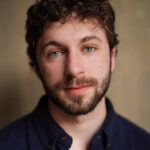
Now open at Camden People’s Theatre, Édouard Louis’ searing autobiographical novella ‘Who Killed My Father’ has been adapted from the original book by Nora Wardell.
Intense and probing, Who Killed My Father examines the small-town life of a father and son; their interactions with homophobia; illness; forgiveness; and the impact of political decision making on the physical body. As a work, it has been framed as a ‘anger transformed to compassion’ from son to father, and a ‘defiant call for social justice.’
A separate adaptation of the book by Ivo van Hove was presented at the Young Vic last year. This production, by surrogate productions, stars Michael Marcus as Édouard under the direction Wardell. Wardell is the artistic director and founder of surrogate, with previous projects including The Guitar Man and Drunk Enough to Say I Love You?
We caught up with Wardell to find out more about her adaptation and what it’s like to be bringing it to Camden People’s Theatre.
Q&A with Nora Wardell
When did you first become aware of Édouard Louis’ book Who Killed My Father?
I first became aware of the book in around 2018. I had read The End of Eddy, Édouard’s first novel that he wrote when he was only 21 years old. And I was aware of both Scottish and international theatre adaptations of his work. So, I knew that his writing translated well to the stage. Who Killed My Father was first commissioned as a theatre piece by Stanislas Nordey at the Théâtre National de Strasbourg, becoming a novella afterwards, and I loved the idea that it came into being as a kind of new dramaturgical form. I sought it out before it was printed in the UK, and the first time I fully heard the novel was through speaking it aloud with my friend whilst doing a literal translation, which is a very fitting way to encounter Édouard’s writing which is so alive and intimate…
What can you tell us about Louis’ autobiographical story?
Who Killed My Father explores Édouard’s relationship with his alcoholic, right-wing father, a factory worker, and the impact of political decision-making on the body, addressing issues around class, masculinity, and homophobia. Édouard grew up gay in the small, rural town of Hallencourt in northern France and endured his father’s homophobia and violence. In 2000, his father had an industrial accident, which left him bed-bound and on morphine for the pain. In the book, Édouard moves back and forward in time, re-remembering his childhood, his father, and the political reforms that shaped their lives. So, the story is about a young man who grows up hating his father, and then at certain moment, discovers that he no longer hates his father, but hates society for making his father who he was.
How strong was your vision for the adaption when you first started working on it, and how
much has it changed?
It wasn’t so much a vision, as a situation that arose from the writing. The central theme of the work is revenge, and how this plays out both personally and politically. In our production, we witness Édouard putting on a play, much like we find in Hamlet, to discover who killed his father. The work is a piece of autobiographical storytelling, so this idea very much came from Édouard’s writing and evolved in collaboration with a brilliant creative team; co-designers Hazel Low and Blythe Brett, lighting designer Joshua Gadsby, sound designer and composer XANA, and of course, through working with our actor who plays Édouard, Michael Marcus, who all worked to support this process of Édouard’s story-telling, which is as much a journey of self-discovery as it is a j’accuse of the French ruling political elite.
What’s it like to also be directing the run at Camden People’s Theatre?
It’s brilliant to be at Camden People’s Theatre. My company, surrogate productions, is Edinburgh-based, so it has been a real joy to get to know CPT and to have opportunity to share this adaptation with London audiences. The entire team at CPT are incredibly hard-working and very kind, which goes a long way in the theatre at this moment, at any moment! We’ve been lucky to be in a venue that cares about stories rooted in real-life experience and has a strong tradition of material addressing socio-political issues. The space is also gorgeous, very small and intimate, so it’s ideal for our work and should make for a
very special audience experience.
What has it been like working with Michael Marcus?
Absolutely wonderful! Michael is a brilliant collaborator. We have worked together before, and I’m not exaggerating when I say it has been a remarkable experience encountering this text together. A one person play is always a real challenge for any actor, to hold an audience for a full 60 minutes, and this piece in particular demands such sensitivity to Édouard’s voice, which is both confrontational and fiercely compassionate. Michael is incredibly intuitive, and his treatment of the text is very delicate and nuanced. He also has an infectious sense of play which has really brought Édouard to life, and that rare ability to directly contact the audience, which sits at the heart of this piece.
What do you hope audiences take away from the play?
I appreciate it will be different for different people … my hope would be that audiences find connection and resonance in this work with their own lives, especially around the questions Édouard is raising around the relationship between class and sexuality, and how the discourse of politicians is deeply imbricated in our personal, emotional lives – or put another way, how words matter, and are intimately bound up with our bodies, our actions, and our capacity for change.
Who Killed My Father? is at Camden People’s Theatre until 2 December














